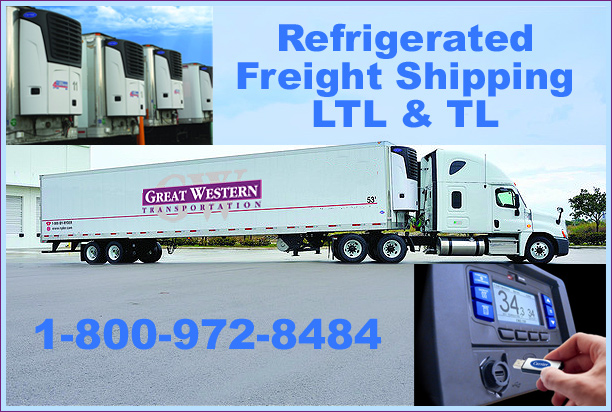Anyone involved with temperature sensitive commodities that ship via refrigerated truck knows what happens when the trailer arrives at the loading dock and the commodity temperature is either too cold or too warm.
The refrigerated shipping dockworkers reject the load, then the blame game and finger pointing begins.
There are several factors that can affect the temperature inside the trailer. However, today we have the technology to monitor the temperatures inside reefer vans real time and relay this data/information to numerous parties.
Modern reefer equipment technology allows for monitoring temperatures inside the trailer on a continuous basis. Temperature recorders keep record of what happens en route, and the data can be extracted or sent real time to a third party if issues arise.
One would think when a problem occurs in a reefer trailer being pulled down the highway, the tractor driver should see the warning light in his mirror or on the dashboard. He should then stop to find out what’s wrong, and reset the reefer unit to correct the problem or arrange for repairs as soon as possible. However, sometimes drivers miss the warning or forget to call in, hence the dispatcher is unaware of the situation. The freight’s temperature wavers, and the rising temperature soon becomes a factor that can damage the freight.
Numerous reefer manufacturers offer remote monitoring solutions with various capabilities, but real-time monitoring and alerts are key functions. Carrier Transicold calls it APX Control System and Thermo King named it TracKing. They are sometimes used with third-party products that add additional features, functions or reporting.
Proper equipment can provide complete solutions for tracking, monitoring and controlling refrigerated trucks, trailers, containers and container gensets. Proper equipment can deliver unmatched capabilities for wireless active control of the reefer environment. Using satellite, cellular or a combination of both the equipment provides:
- GPS tracking
- Full reefer unit monitoring including all alarms, reefer operational status and state changes
- Complete two-way remote configuration of the reefer microcontroller
A Brief History of Refrigerated Transportation
Beginning in the 1840s the refrigerated freight shipping industry began, refrigerated railroad cars were used to transport milk and butter. By 1860, refrigerated transport was limited to primarily seafood and dairy products. The refrigerated railroad car was patented by J.B. Sutherland of Detroit, Michigan in 1867. He designed an insulated car with ice bunkers in each end of the railroad car. Air would enter through the top of the car, passed through the ice bunkers, and circulated through the car by gravity and convection. This movement of air was controlled by the use of hanging flaps that created differences in air temperature. The first refrigerated railroad car was designed to transport fresh fruit and was built in 1867 by Parker Earle of Illinois, who shipped strawberries via the Illinois Central Railroad. Each chest contained 100 pounds of ice and 200 quarts of strawberries. It was not until 1949 that a refrigeration system began to develop in the trucking industry by using a trailer roof-mounted cooling device, which was invented by Fredrick M. Jones.
Frederick M. Jones patented an automatic refrigeration system for long-haul tractor-trailers in 1939 (a trailer roof-mounted cooling device). His was a practical, mechanical refrigeration system for trucks and railroad cars, which eliminated the risk of food spoilage during long-distance shipping trips. The refrigeration system was, in turn, adapted to a variety of other common carriers, including ships. Frederick M. Jones was issued the patent on December 1, 1942 (#2,303,857) titled “Air Conditioner for Vehicles”. So the frozen and chilled food shipping industry began, plus all the many other commodities that need to ship frozen or chilled.
Frozen, Chilled LTL and TL Transport Today
At Great Western Transportation, we built our reputation by delivering on some of the more challenging refrigerated transportation loads – small refrigerated and frozen shipments. LTL and TL frozen or chilled food, fruits, vegetables and other temperature sensitive commodities are the types of commodities we transport on a regular basis. Picking up and delivering small, geographically dispersed shipments of chilled and frozen freight, presents a number of challenges in making sure your commodities are delivered at the required temperature.
Being able to ship smaller volume shipments at an affordable price is an advantage to the shipper, but not if it comes at the expense of loss of your shipments due to improper temperature. The LTL refrigerated carrier must have the proper procedures in place, since every time the truck makes a stop your freight may reach an improper temperature.
So let’s look at a typical temperature sensitive scenario for you to consider. Your commodity is being delivered on a warm, 90-degree day at a large warehouse. The driver is instructed to open up his reefer trailer doors and back into an unloading dock. As soon as the door is open, your commodity is exposed to the outside temperature. If the dock is not refrigerated, the exposure of your product to the 90-degree temperature will go on as long as the reefer trailer doors are open.
Even if the truck continues to run the refrigerated unit, problems may still occur. The outside air will contain higher humidity, which will condensate on his unit. While the reefer trailer doors are kept open, the reefer refrigeration unit will work at full capacity and remain on, to keep the trailer cool, this will cause condensation to quickly form on the coils. As condensation builds on the coils, the reefer will automatically shut down in order to defrost. This is why reefer LTL trucks must turn off their reefer unit during loading and unloading.
How long your refrigerated freight will be exposed to these outside temperatures depends on how quickly the freight will be off loaded and put into a suitable temperature environment.
Not only is your product being put at risk when it’s being delivered; but at every stop along the way for the other shipments on the trailer. How long it can stand up to these conditions depends a lot on the density of your product and how quickly it is adversely affected by the temperature change. Depending on your product, it may not just be warm weather you’re worried about. If it’s a product that is prone to freezing or needs to be kept fresh, most of the same risks apply in severe cold weather.
This is only one of many situations that a good LTL refrigerated truck service has to be alert to. Others include the temperature of adjacent freight, the accuracy of monitoring devices, etc.
It’s important to know each temperature sensitive commodity and its requirements. We continue to maintain an extensive database of specific commodities and their temperature requirements. When receiving orders we classify every shipment. Any shipment that is highly sensitive is tagged throughout our system for careful monitoring by operations as well as customer service.
We may ask a lot of questions about your refrigerated freight up front to make certain we understand the commodity you are shipping and its temperature requirements. We’re glad to share our experience with you and the standards that we apply. If your product requires temperature sensitive transit, we will provide equipment to do that.
The drivers pre-cool the trailer prior to pickup, ensuring the freight being loaded retains its temperature due to the lowered temperature in the trailer. It is important to note that the trailer’s refrigeration unit (reefer) is designed to control the air temperature inside the trailer so that the product temperature remains within a reasonable temperature tolerance. The refrigeration unit is not designed to bring down the commodity temperature of a warm commodity.
The drivers always accurately check the product temperature at the pickup location. With LTL loads there are multiple pickups done by a single truck. If one customer sends out a warm commodity it can raise the air temperature in the trailer, putting other commodities on board at risk. That is why it is critical to ensure a commodity is at the proper temperature at the pickup location or it can endanger the commodities on-board.
It’s important to work with your shipping department as well as your receivers to allow our drivers to monitor and check the freight. Our goal is to make sure your freight and all of our customers’ freight is being protected and cared for.
Extra precautions are taken to protect your refrigerated freight while waiting at a dock with the door open. When there are warmer temperatures outside, the reefer unit is turned off to prevent it from condensing and going into defrost mode. Even when the reefer is turned off, the trailer ambient temperature will stay cool or remain low. This is because a triple foam core bulkhead at the rear of the trailer is implemented. The foam barrier is used like an insulating door and is not physically removed until the shipper or receiver is actually ready to move freight. This rear insulating door or bulkhead is used in all conditions, warm or cold. Insulating the inside of the trailer from the outside temperature and keeps the air and commodity temperatures inside the trailer at their required levels even while the trailer door is open.
Most LTL refrigerated shipments are brought to a cross-dock location for staging and reloading before delivery, this adds another risk to the refrigerated freight being exposed to improper temperatures.
Depending on their origin and destination, LTL reefer shipments will be in transit for several days, which makes maintaining the refrigerated freight temperature for chilled and frozen reefer shipments vital.
Our load consultants set up, confirm and track delivery appointments and instruct the drivers on what to expect at each receiver’s dock. We confirm information on hundreds of locations including requirements such as receiving hours and dock regulations so there are no surprises when the driver and refrigerated truck arrives.
Let us prove to you that Great Western Transportation is your Premier Trucking Service.
Call us for information about our trucking services or for a rate quote.
Great Western Transportation 5000 Pleasanton Ave, Suite 145 Pleasanton, CA 94566






